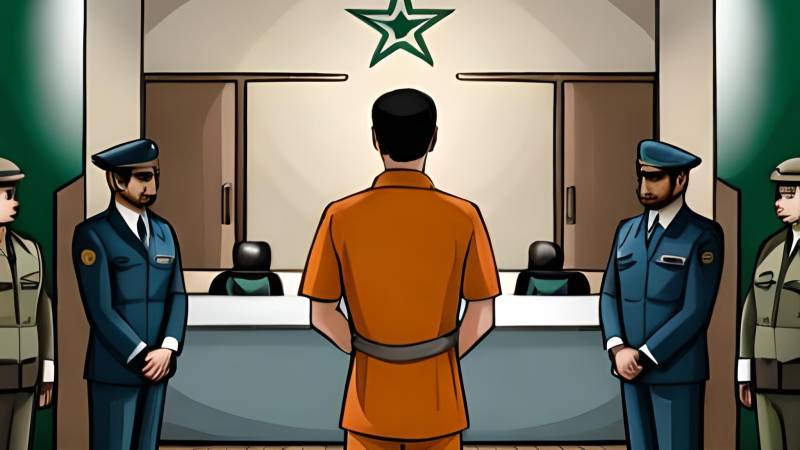
The Federal Defence Ministry and the Balochistan provincial ministry on Friday challenged a decision by a five-member bench of the Supreme Court that declared the trial of civilians in military courts as ultra vires the Constitution.
In a petition filed before the apex court, the ministry argued that the petitions on which the five-member bench of the Supreme Court had decided the matter in October were inadmissible.
It added that their order, which all but reversed the provisions of the Army Act and the Official Secrets Act, would cause irreparable damage.
The petition filed by the Ministry of Defense further requested to annul the decision not to try the accused in special courts and to restore the invalidated provisions of the Official Secrets Act.
The petition stated that the Supreme Court did not properly evaluate the law and the facts. It is requested that the repealed provisions of the Army Act and the Official Secrets Act be restored.
The Ministry of Defense also urged the court to restore Section 59(4) of the Army Act, which the previous order had struck down, should also be restored, and an injunction should be issued against the trial in special courts pending final decision on the appeals.
The federal government has also objected to the composition of the bench which heard the case. The petition contended that Sections 2 and 3 of the Practice and Procedure Act (PPA) 2023 were not followed.
Section 2 of the Act mandates that a bench hearing petitions under Article 184(3) of the Constitution must be constituted by a Committee comprising of the Chief Justice of Pakistan and two senior most judges of the top court.
Under Section 3 of the Act, matters invoking the court's jurisdiction under Article 184(3) are to be first placed before this committee, which, upon examination, would constitute a bench for adjudication on the matter.
However, the petition noted that the constitutional validity of the PPA 2023 was challenged, and an interim order was issued on April 13. However, in its majority judgment in October, petitions challenging the constitutionality of the PPA 2023 were dismissed, and the Act was held to be in accordance with the Constitution.
Since this appeal arose out of a petition that was filed after the act had taken effect on April 21, 2023, the petition challenging the trial of civilians in military courts was not maintainable.
It is pertinent to mention here that those currently facing trials in military courts are accused of attacking Corps Commander House, PAF Base Mianwali, ISI Establishment Civil Lines in Faisalabad, Sialkot Cantt, ISI Establishment Hamza Camp Rawalpindi, Gujranwala Cantt, Bannu Cantt and Peshawar Radio Station in Peshawar Cantt.
The government stated that some 62 incidents of violence were reported in Punjab alone, causing injuries to approximately 250 people, including 184 law enforcement personnel. Additionally, 139 vehicles, including 98 official vehicles, were partially or completely damaged.
The violence caused damage worth an estimated Rs2.54 billion, including Rs1.983 billion in losses to the military establishments, equipment and vehicles.
"The legislative intent, in enacting these provisions of the Army Act, is, therefore, clear. It is to ensure that where civilians commit offences which have the effect of interfering with the members of the armed forces' proper discharge of duties, such civilians are tried under the Army Act," the petition argued.
Several judicial and quasi-judicial forums, independent from the ordinary district courts (civil as well as criminal courts), have been created under the authority of various acts in a manner similar to the Army Act, it contended.
"A trial by court-martial does not curtail the rights guaranteed under the law," it assured, adding that it was not "in any manner may be prejudicial, violative, or contrary to the principles of natural justice, due process of law, and the right to a fair trial."
"As such, a court martial merely provides for an efficient judicial structure to entertain, in accordance with the law, offences under the Army Act, related to the security of personnel and establishments of the Armed Forces of Pakistan."
On the other hand, the caretaker government of Balochistan has filed an appeal against stopping the trial of civilians in military courts. The caretaker government in Sindh is also expected to file a petition in which it will likely say that the trial of those accused of attacking military installations should be tried in military courts.
The Sindh government is likely to urge that until their petition is decided, the order to halt the trial of civilians in military courts should be suspended.
The Federal Defence Ministry had engaged senior lawyer Khawaja Haris while Sindh had hired Jahanzaib Awan to represent it before the top court.
In October, a five member larger bench headed by Justice Ijazul Ahsan had unanimously declared the trials of civilians in military courts as null and void.
The bench had ordered that the 103 civilians accused in cases of violence on May 9 and May 10 should be tried in relevant criminal courts under ordinary laws.
However, the larger bench, by a majority of 4 to 1, also declared Section 2D(i) and 2D(ii), Section 59(4) of the Pakistan Army Act as ultra vires of the Constitution and of no legal effect.
The other bench members were Justice Munib Akhtar, Justice Yahya Afridi, Justice Mazahir Ali Akbar Naqvi, and Justice Ayesha Malik.
Justice Yahya Afridi had reserved his judgement to the extent of sections of the Pakistan Army Act 1952.
PTI Chairman Imran Khan was one of the petitioners who challenged the trials of civilians in military courts. Senior lawyer Khawaja Haris has previously represented former prime minister and Pakistan Tehreek-e-Insaf (PTI) Chairman Imran Khan in several cases, including the Toshakhana and the National Accountability Bureau (NAB) amendment cases. Now, he will argue on military courts to try civilians who were allegedly involved in attacks on military installations, most of whom belong to the PTI, on behalf of the defence ministry and the military.

